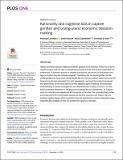Files in this item
Rationality and cognitive bias in captive gorillas’ and orang-utans’ economic decision-making
Item metadata
| dc.contributor.author | Lacombe, Penelope | |
| dc.contributor.author | Brocard, Sarah | |
| dc.contributor.author | Zuberbühler, Klaus | |
| dc.contributor.author | Dahl, Christoph D. | |
| dc.date.accessioned | 2022-12-15T10:30:05Z | |
| dc.date.available | 2022-12-15T10:30:05Z | |
| dc.date.issued | 2022-12-14 | |
| dc.identifier | 282581558 | |
| dc.identifier | 4645a6ce-8857-4144-9081-4e529e71f8b4 | |
| dc.identifier | 85144098567 | |
| dc.identifier | 000925168900025 | |
| dc.identifier.citation | Lacombe , P , Brocard , S , Zuberbühler , K & Dahl , C D 2022 , ' Rationality and cognitive bias in captive gorillas’ and orang-utans’ economic decision-making ' , PLoS ONE , vol. 17 , no. 12 , e0278150 . https://doi.org/10.1371/journal.pone.0278150 | en |
| dc.identifier.issn | 1932-6203 | |
| dc.identifier.other | RIS: urn:F4C1AB7CC9BE7290238ECDC80D319C6A | |
| dc.identifier.other | ORCID: /0000-0001-8378-088X/work/124889139 | |
| dc.identifier.uri | https://hdl.handle.net/10023/26600 | |
| dc.description | Funding: This work was supported with funding by the Swiss National Science Foundation (grant PZ00P3_154741 (CDD), 310030_185324 (KZ), and NCCR Evolving Language (Agreement #51NF40_180888 (KZ)), and the Taipei Medical University (Startup-funding, grant 108-6402-004-112 (CDD)). | en |
| dc.description.abstract | Human economic decision-making sometimes appears to be irrational. Partly, this is due to cognitive biases that can lead to suboptimal economic choices and context-dependent risk-preferences. A pertinent question is whether such biases are part of our evolutionary heritage or whether they are culturally acquired. To address this, we tested gorillas (Gorilla gorilla gorilla) and orang-utans (Pongo abelii) with two risk-assessment experiments that differed in how risk was presented. For both experiments, we found that subjects increased their preferences for the risky options as their expected gains increased, showing basic understanding of reward contingencies and rational decision-making. However, we also found consistent differences in risk proneness between the two experiments, as subjects were risk-neutral in one experiment and risk-prone in the other. We concluded that gorillas and orang-utans are economically rational but that their decisions can interact with pre-existing cognitive biases which modulates their risk-preference in context-dependent ways, explaining the variability of their risk-preference in previous literature. | |
| dc.format.extent | 22 | |
| dc.format.extent | 1053202 | |
| dc.language.iso | eng | |
| dc.relation.ispartof | PLoS ONE | en |
| dc.subject | BF Psychology | en |
| dc.subject | DAS | en |
| dc.subject | MCC | en |
| dc.subject.lcc | BF | en |
| dc.title | Rationality and cognitive bias in captive gorillas’ and orang-utans’ economic decision-making | en |
| dc.type | Journal article | en |
| dc.contributor.institution | University of St Andrews. School of Psychology and Neuroscience | en |
| dc.contributor.institution | University of St Andrews. Institute of Behavioural and Neural Sciences | en |
| dc.contributor.institution | University of St Andrews. Centre for Social Learning & Cognitive Evolution | en |
| dc.identifier.doi | 10.1371/journal.pone.0278150 | |
| dc.description.status | Peer reviewed | en |
This item appears in the following Collection(s)
Items in the St Andrews Research Repository are protected by copyright, with all rights reserved, unless otherwise indicated.

